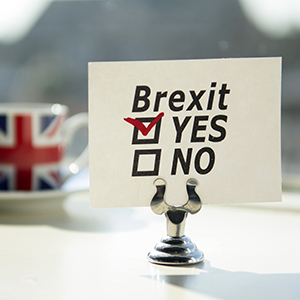Main page content

The United Kingdom (UK) recently voted to leave the European Union, sending markets into a free fall, pushing the British pound to a 30 year low, and prompting the announcement of the resignation of UK Prime Minister David Cameron, initially scheduled for October. The initial knee-jerk reaction has been sharp in currency, equity, and fixed income markets around the world, but there is likely remedial action forthcoming from global Central Banks in particular the Bank of England. Although this vote “shocked” the markets in the short term, democracy has proven to work well historically and we expect the same for the UK’s vote for “independence” from the European Union.
Likely no country is more surprised by the vote to “leave” the Euro than Britain itself. The vote was broadly expected to favor for the UK to “Remain.” Instead, “Leave” the Euro won handily with 52% to 48%. Markets inevitably experience corrections, which is certainly not a surprise, though that is likely cold comfort for investors in the midst of one. As with any correction, however, now is the time to persist with your investment plan created in calmer times and avoid any rash actions that may be inconsistent with your long-term investment goals.
Here are a few key details:
- The June 23rd British referendum asked a simple question “Should the United Kingdom remain a member of the European Union or leave the European Union?”
- British citizens voted the latter, to “Leave the European Union”.
- Markets were priced for the status quo since the ramifications of leaving the European Union - on bilateral trade and bilateral banking exposure - to the UK and global economy are immense.
- The unwinding process will take time. It will not happen immediately. Implementing Article 50, which details the rules for leaving the European Union, will likely take at least two years.
- This is an unprecedented move for the European Union and for the fifth largest economy in the world. It will likely have ripple effects.
Global Market Reaction
Global market reaction was swift across currencies, commodities, global equities, and bonds. Safe haven assets such as the US dollar, Japanese yen, and gold have surged while most other assets corrected sharply. Developed markets have taken the brunt of the sell-off as emerging markets are less impacted by these kinds of developments.
Here are some things to keep in mind amid the uncertainty:
- The financial system is far more resilient than it was in 2008.
- Central Banks stand ready to intervene and provide stability. It is expected the Federal Reserve will not raise interest rates for the remainder of 2016, the Bank of England will cut rates, and the ECB stands ready to provide liquidity. These are all market positives.
- This is likely more similar to market disruptions due to the August 5, 2011 downgrade of the United States debt rating, rather than the 2008 Lehman Bank crisis.
- Like the US credit downgrades, markets were extremely volatile in the short term - initially down sharply then up just as sharply - which went on for some time.
- This is not a black swan event, which was unpredictable. It was a democratic vote that was close, widely publicized, and known in advance.
- This could be a wake-up call to politicians that pro-growth economic reforms are needed rather than reliance on monetary stimulus.
Article provided courtesy of Voya Financial.

